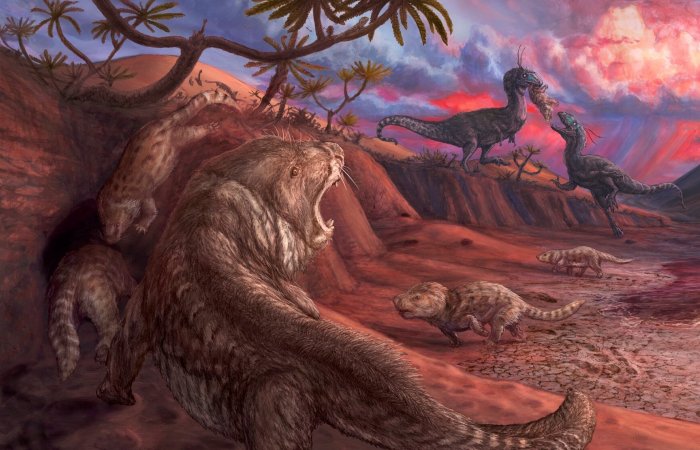Eddie Gonzales Jr. – MessageToEagle.com – While documenting fossil tracksites along a stretch of Lake Powell, a Glen Canyon National Recreation Area (Glen Canyon NRA) field crew discovered the first tritylodontid bonebed found in the Navajo Sandstone in Utah. These extremely rare fossils are one of the more important fossil vertebrate discoveries in the United States this year.
The discovery included body fossils like bones and teeth, which are rare in the geologic formation known as the Navajo Sandstone within the Glen Canyon Group. This new discovery will shed light on the fossil history exposed on the changing shorelines of Lake Powell.
A painting depicting an Early Jurassic scene from the Navajo Sandstone desert preserved at Glen Canyon NRA. A small team of paleontologists worked with artist Brian Engh to provide a technically accurate depiction of the rare and enigmatic tritylodonts (close mammal relatives) discovered in March during low water levels of Lake Powell. Credit: NPS / Brian Engh
In March 2023, paleontologists were documenting fossil tracksites when they discovered a rare fossil horizon that was full of the impressions of bones and bone fragments of tritylodontid mammaliaforms, or early herbivorous mammal-relatives from the Early Jurassic (approximately 180 million years ago).
The site had been submerged by Lake Powell’s fluctuating water levels and was only found because the paleontologists were in the right place at the right time before annual snowmelt filled the lake. Field teams were only able to access the location for a very short window of time (approximately 120 days) to recover the fossils. Additionally, another rare bone bed was discovered nearby in the slightly older Kayenta Formation.
The crew collected several hundred pounds of rocks encasing the fossil bones and skeletons at the site. These will be scanned with X-ray computerized tomography (CT) at the University of Utah South Jordan Health Center, mechanically prepared and studied at St. George Dinosaur Discovery Site at Johnson Farm (SGDS) by the lab and collections crew volunteers, with help from Petrified Forest National Park and the Smithsonian Institution.
The fossils will become part of the Glen Canyon NRA museum collections to be housed at the Prehistoric Museum in Price, Utah. Studying these fossils will help paleontologists learn more about how early mammal relatives survived the mass extinction at the end of the Triassic Period and diversified through the Jurassic Period.
Andrew Milner, site paleontologist and curator at SGDS, is the lead author of an article describing a related site published in the open access journal Geology of the Intermountain West.
This and other recent Glen Canyon NRA fossil discoveries were discussed at an October 11, 2023, National Fossil Day interpretive event held at Zion National Park. The invited speaker was Andrew Milner, Site Paleontologist and Curator from the St. George Dinosaur Discovery Site at Johnson Farm (SGDS). Mr. Milner was part of the crew that made the rare discoveries and is assisting with their curation and research.
Glen Canyon NRA thanks Petrified Forest National Park paleontologist Adam Marsh, who is a subject matter expert on this period of paleontological history and was able to join the field team.
The towering geologic formations that surround Lake Powell are home to a vast suite of unexplored fossil remains, making Glen Canyon NRA one of the National Park Service’s (NPS) most significant areas for paleontological research.
The most famous and abundant fossils known from Glen Canyon NRA are the footprints of meat-eating dinosaurs in the Glen Canyon Group. This series of sedimentary rocks, named after their exposures along the canyon itself, were laid down by rivers, lakes, streams and deserts from the Late Triassic Epoch through the Early Jurassic Epoch. One of the largest mass extinctions in Earth’s history happened during this period.
The study was published in the journal Geology of the Intermountain West
Written by Eddie Gonzales Jr. – MessageToEagle.com – Staff Writer








